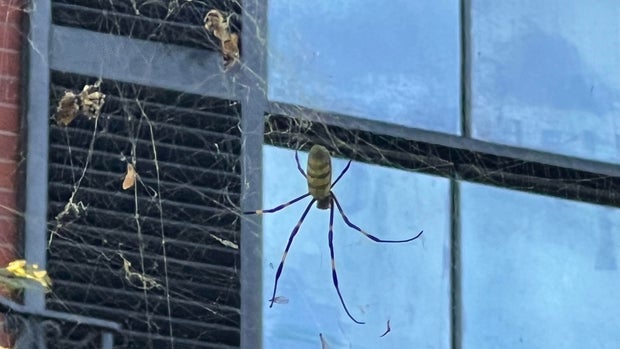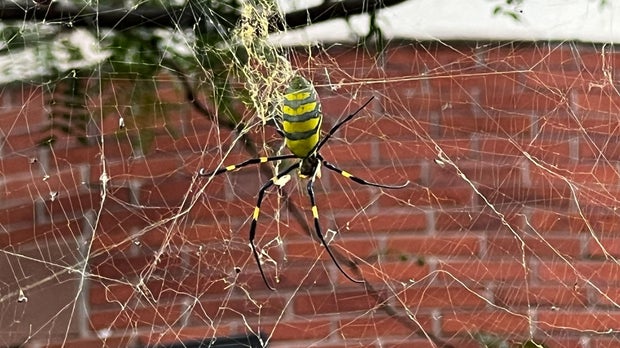Joro spider native to East Asia spotted for the first time in Boston
BOSTON - A Joro spider has made it to Massachusetts. The giant, venomous arachnid was spotted in Boston's Beacon Hill neighborhood.
Mount Vernon Street resident Sally Rogers shared photos of the big black and yellow spider in its web with WBZ-TV.
 A Joro spider in Boston's Beacon Hill neighborhood.
Sally Rogers
A Joro spider in Boston's Beacon Hill neighborhood.
Sally Rogers
"I would hope somebody would come and retrieve it and put it in a mason jar with a lid and some holes so it can live," said Beacon Hill resident Claudia Liberatore, who lives near the spider.
Ecologists said earlier this year that it's a matter of when, not if the Joro spiders spread to the northeast.
What is a Joro spider?
A Joro spider is recognizable for its vibrant yellow color and legs that can grow up to 4 inches long.
They "fly" by releasing silk threads into the air that allow them to parachute in the wind, a New Jersey pest company explained.
The Joros are an invasive species that were first spotted in Georgia in 2014 and have rapidly spread along the South.
 The Joro spider seen in Boston.
Mike Sullivan/WBZ-TV
The Joro spider seen in Boston.
Mike Sullivan/WBZ-TV
"That's pretty much a baby compared to what we see at home," said Dan Roberts, a tourist visiting Boston from Australia. "Pretty much everything wants to eat you in Australia. Catch moths and feed them. And have a great relationship with the spiders and they'll love you back."
Are Joro spiders dangerous?
While Joro spiders are venomous, they are afraid of people and rarely bite, according to Penn State Extension.
"The venom is weak, so when bites do occur they are less painful than a bee sting and only produce localized pain and redness that dissipates quickly without intervention," the organization said.
Researchers say spiders are no threat to humans and they eat insects or whatever else gets caught in their webs.
"They're not going to harm you, they're not going to come for your pets," said Andy Davis, a researcher at the University of Georgia. "They're actually spreading north right now because they're hitchhiking on people's cars and trucks."
Davis said Boston's climate is similar to the spiders' native habitat in northern Japan.
"Two years ago, I had done a study looking at the physiology of this species to see if they could survive a cold climate and in fact, my research shows that they can."
Neal J. Riley is a digital producer for CBS Boston. He has been with WBZ-TV since 2014. His work has appeared in The Boston Globe and The San Francisco Chronicle. Neal is a graduate of Boston University.

 By CBS (U.S.) | Created at 2024-09-25 22:42:12 | Updated at 2024-09-30 09:29:04
4 days ago
By CBS (U.S.) | Created at 2024-09-25 22:42:12 | Updated at 2024-09-30 09:29:04
4 days ago



